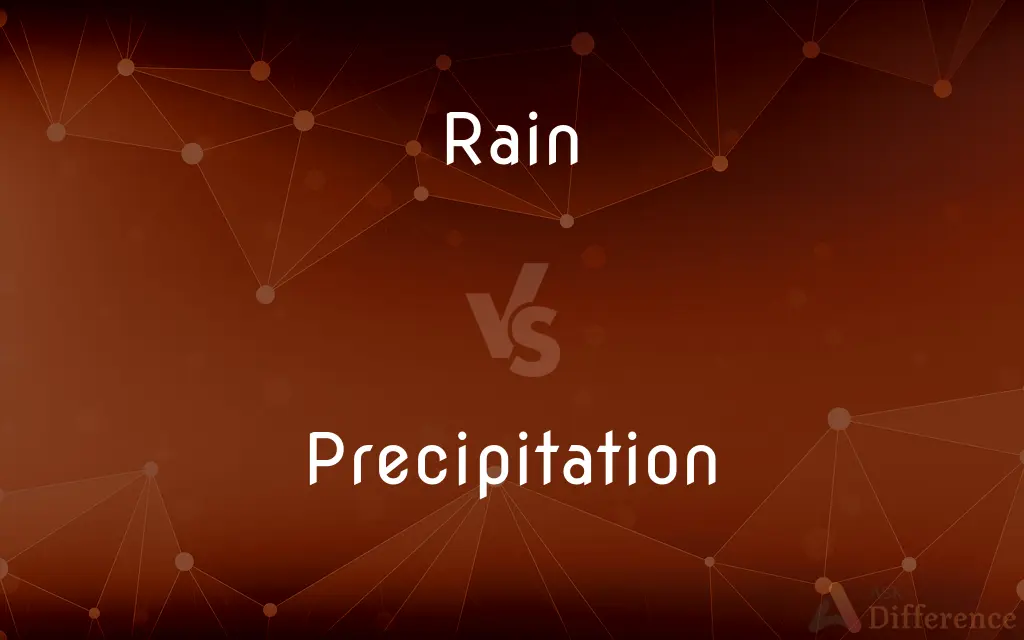Rain vs. Precipitation — What's the Difference?
By Maham Liaqat & Fiza Rafique — Updated on March 25, 2024
Rain is liquid precipitation from clouds, often associated with storms, while precipitation includes any form of water, liquid or solid, falling from the sky.

Difference Between Rain and Precipitation
Table of Contents
ADVERTISEMENT
Key Differences
Rain refers to the water droplets that fall from clouds when they become too heavy. It is a key component of the water cycle and significantly impacts the environment and human activities. Whereas precipitation is a broader term that encompasses all forms of water, whether liquid or solid, falling from the atmosphere. This includes rain, snow, sleet, and hail, making it a critical factor in weather and climate studies.
While rain is typically observed as liquid water droplets, precipitation can take various forms depending on the atmospheric conditions. Snow, for example, forms when temperatures are low enough to freeze the water droplets into ice crystals. On the other hand, rain occurs when the air temperature is above freezing, allowing water droplets to remain liquid as they fall to the ground.
Rain is measured in terms of the amount of water that falls over a specific area, usually expressed in millimeters or inches. It significantly affects agriculture, water supply, and urban planning. Precipitation, however, is measured not only by the amount of water that falls but also by its type. Different forms of precipitation have varying impacts on the environment, agriculture, and infrastructure.
The occurrence of rain is often associated with specific types of clouds, particularly cumulonimbus or nimbostratus, which are capable of producing significant rainfall. Precipitation, on the other hand, can occur from a variety of cloud types, including stratus clouds for snow and cumuliform clouds for hail, showcasing the diversity of atmospheric phenomena that can lead to water reaching the earth's surface.
Rain plays a crucial role in replenishing freshwater resources, supporting plant growth, and maintaining the balance of various ecosystems. Precipitation, in its many forms, is essential for the hydrological cycle, affecting water availability, climate patterns, and even the geographic distribution of habitats and species.
ADVERTISEMENT
Comparison Chart
Definition
Water droplets falling from clouds
Any form of water, liquid or solid, falling from the atmosphere
Forms
Liquid only
Includes rain, snow, sleet, hail
Temperature Conditions
Above freezing
Varies; can be above or below freezing
Measurement
Millimeters or inches of liquid water
Millimeters or inches, but includes considerations for type
Associated Clouds
Cumulonimbus, Nimbostratus
Various, including Stratus, Cumulus, Cumulonimbus
Compare with Definitions
Rain
Liquid precipitation consisting of water droplets.
The rain soaked the ground after the dry spell.
Precipitation
Includes diverse forms like snow and hail.
The precipitation turned to sleet by evening.
Rain
Measured in millimeters or inches.
Last night's rain measured at three inches.
Precipitation
Any form of water falling from the sky.
Today's precipitation could be snow or rain.
Rain
A natural process vital for the water cycle.
Rain is crucial for replenishing the city's reservoirs.
Precipitation
Impacts on weather and climate studies.
Scientists study precipitation to understand climate trends.
Rain
Often associated with thunderstorms.
The forecast predicts heavy rain with possible thunder.
Precipitation
Influences water supply and infrastructure.
Cities plan their drainage systems based on expected precipitation.
Rain
Affects agriculture and ecosystems.
Consistent rain is vital for the spring crops.
Precipitation
Essential for the hydrological cycle.
Precipitation patterns are changing due to climate change.
Rain
Rain is liquid water in the form of droplets that have condensed from atmospheric water vapor and then become heavy enough to fall under gravity. Rain is a major component of the water cycle and is responsible for depositing most of the fresh water on the Earth.
Precipitation
In meteorology, precipitation is any product of the condensation of atmospheric water vapor that falls under gravitational pull from clouds. The main forms of precipitation include drizzling, rain, sleet, snow, ice pellets, graupel and hail.
Rain
The condensed moisture of the atmosphere falling visibly in separate drops
It's pouring with rain
The rain had not stopped for days
Precipitation
The action or process of precipitating a substance from a solution.
Rain
Rain falls
It was beginning to rain
Precipitation
Rain, snow, sleet, or hail that falls to or condenses on the ground
These convective processes produce cloud and precipitation
The heavy post-monsoon precipitations
Rain
Water condensed from atmospheric vapor and falling in drops.
Precipitation
The fact or quality of acting suddenly and rashly
Cora was already regretting her precipitation
Rain
A fall of such water; a rainstorm.
Precipitation
Any form of water, such as rain, snow, sleet, or hail, that falls to the earth's surface.
Rain
The descent of such water.
Precipitation
The quantity of such water falling in a specific area within a specific period.
Rain
Rainy weather.
Precipitation
A hastening or acceleration, especially one that is sudden or unexpected
He is responsible for the precipitation of his own demise.
Rain
Rains A rainy season.
Precipitation
Abrupt or impulsive haste.
Rain
A heavy or abundant fall
A rain of fluffy cottonwood seeds.
A rain of insults.
Precipitation
A headlong fall or rush.
Rain
To fall in drops of water from the clouds.
Precipitation
(Chemistry) The process of separating a substance from a solution as a solid.
Rain
To fall like rain
Praise rained down on the composer.
Precipitation
(meteorology) Any or all of the forms of water particles, whether liquid or solid, that fall from the upper atmosphere (e.g., rain, hail, snow or sleet). It is a major class of hydrometeor, but it is distinguished from cloud, fog, dew, rime, frost, etc., in that it must fall. It is distinguished from cloud and virga in that it must reach the ground.
Rain
To release rain.
Precipitation
A hurried headlong fall.
Rain
To send or pour down.
Precipitation
A reaction that leads to the formation of a heavier solid in a lighter liquid; the precipitate so formed at the bottom of the container.
Rain
To give abundantly; shower
Rain gifts.
Rain curses upon their heads.
Precipitation
(figuratively) Unwise or rash rapidity; sudden haste.
Rain
Condensed water falling from a cloud.
We've been having a lot of rain lately.
The rains came late that year.
Precipitation
The act of precipitating, or the state of being precipitated, or thrown headlong.
In peril of precipitationFrom off rock Tarpeian.
Rain
(figuratively) Any matter moving or falling, usually through air, and especially if liquid or otherwise figuratively identifiable with raindrops.
Precipitation
A falling, flowing, or rushing downward with violence and rapidity.
The hurry, precipitation, and rapid motion of the water, returning . . . towards the sea.
Rain
(figuratively) An instance of particles or larger pieces of matter moving or falling through air.
A rain of mortar fire fell on our trenches.
Precipitation
Great hurry; rash, tumultuous haste; impetuosity.
Rain
(impersonal) To have rain fall from the sky.
Judging by the black cloud, it will rain later today.
Precipitation
The act or process of precipitating from a solution.
Rain
(intransitive) To fall as or like rain.
Tears rained from her eyes.
Leaves rained from the tree.
Bombs rained from the sky.
Precipitation
A deposit on the earth of hail, mist, rain, sleet, or snow; also, the quantity of water deposited.
Rain
(transitive) To issue (something) in large quantities.
The boxer rained punches on his opponent's head.
Precipitation
The quantity of water falling to earth at a specific place within a specified period of time;
The storm brought several inches of precipitation
Rain
Reign.
Precipitation
The process of forming a chemical precipitate
Rain
Water falling in drops from the clouds; the descent of water from the clouds in drops.
Rain is water by the heat of the sun divided into very small parts ascending in the air, till, encountering the cold, it be condensed into clouds, and descends in drops.
Fair days have oft contracted wind and rain.
Precipitation
The falling to earth of any form of water (rain or snow or hail or sleet or mist)
Rain
To fall in drops from the clouds, as water; - used mostly with it for a nominative; as, it rains.
The rain it raineth every day.
Precipitation
The act of casting down or falling headlong from a height
Rain
To fall or drop like water from the clouds; as, tears rained from their eyes.
Precipitation
An unexpected acceleration or hastening;
He is responsible for the precipitation of his own demise
Rain
To pour or shower down from above, like rain from the clouds.
Then said the Lord unto Moses, Behold, I will rain bread from heaven for you.
Precipitation
Overly eager speed (and possible carelessness);
He soon regretted his haste
Rain
To bestow in a profuse or abundant manner; as, to rain favors upon a person.
Rain
Water falling in drops from vapor condensed in the atmosphere
Rain
Drops of fresh water that fall as precipitation from clouds
Rain
Anything happening rapidly or in quick successive;
A rain of bullets
A pelting of insults
Rain
Precipitate as rain;
If it rains much more, we can expect some flooding
Common Curiosities
What conditions lead to rain instead of snow?
Rain occurs when the atmospheric temperature is above freezing, allowing water droplets to stay liquid.
What role does rain play in agriculture?
Rain provides essential water for crops, affecting yields and farming practices.
Can precipitation occur in forms other than rain?
Yes, precipitation can occur as snow, sleet, hail, and other forms, not just rain.
How do different forms of precipitation impact the environment?
Different forms of precipitation have varied effects on water availability, soil moisture, and habitat conditions.
What is the main difference between rain and precipitation?
Rain is specifically liquid water falling from clouds, while precipitation includes any form of water, liquid or solid, falling from the atmosphere.
How is rain measured?
Rain is measured by the depth of water that falls over a given area, typically in millimeters or inches.
What factors influence the type of precipitation that falls?
Atmospheric conditions, temperature, and humidity levels are key factors determining precipitation type.
Is all rain the same intensity?
No, rain can vary from light showers to heavy downpours, affecting accumulation and impact.
How do cities manage varying types of precipitation?
Cities design infrastructure like drainage systems to manage different types of precipitation, from rain to snow.
Do all clouds produce precipitation?
Not all clouds produce precipitation; it depends on their type and the atmospheric conditions present.
How does precipitation contribute to the hydrological cycle?
Precipitation is a key phase in the hydrological cycle, replenishing surface and groundwater sources.
Why is precipitation important?
Precipitation is crucial for the water cycle, affecting water supply, climate, agriculture, and ecosystems.
Can the amount of precipitation vary significantly in different regions?
Yes, precipitation patterns vary widely across different geographic areas due to climate and topography.
Why is measuring precipitation important?
Measuring precipitation helps in weather forecasting, planning for water resources, and understanding climate trends.
Can precipitation patterns change over time?
Yes, precipitation patterns can change due to factors like climate change, affecting ecosystems and human activities.
Share Your Discovery

Previous Comparison
Habitat vs. Habit
Next Comparison
Lyophilized vs. LyophilisedAuthor Spotlight
Written by
Maham LiaqatCo-written by
Fiza RafiqueFiza Rafique is a skilled content writer at AskDifference.com, where she meticulously refines and enhances written pieces. Drawing from her vast editorial expertise, Fiza ensures clarity, accuracy, and precision in every article. Passionate about language, she continually seeks to elevate the quality of content for readers worldwide.















































